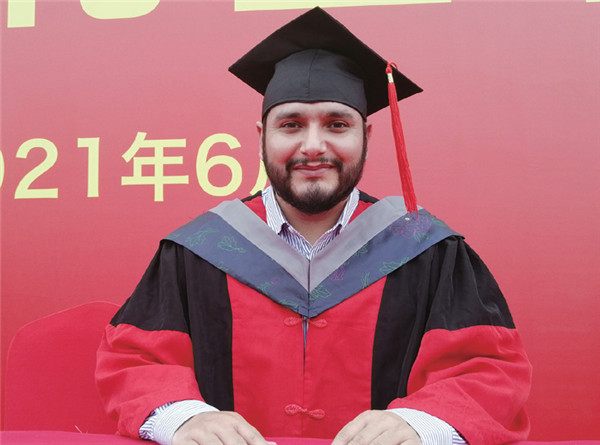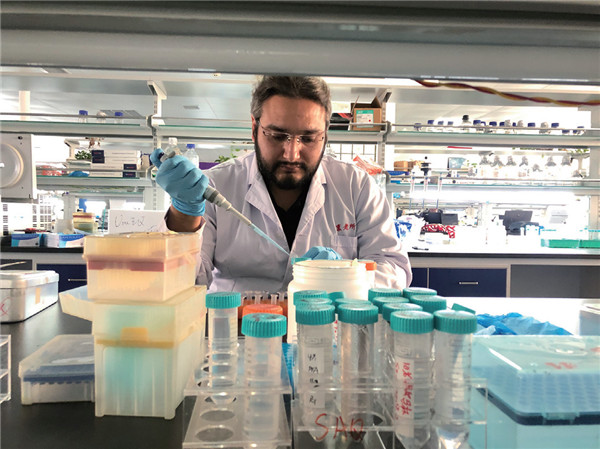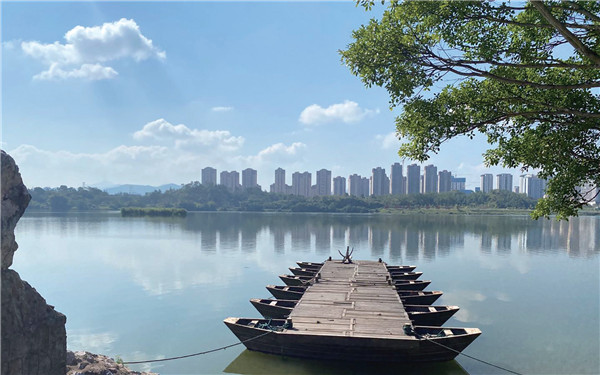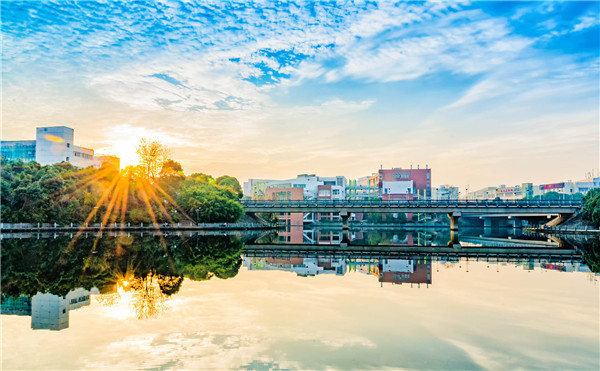新冠:一个转变的契机
[巴基斯坦] 王旭 南昌大学

2020年跟我记忆中以前的新年一样开始了。这是我在中国的第四个年头。一如往常,随着新年的到来,我有一种无法言说的兴奋感,庆祝春节——中国年。我可以清晰地感觉到空气中弥漫着幸福、兴奋和喜悦。不需要别人提醒,自己就能感受到节日的来临。跟往年一样,一个学期结束了,所有的考试也结束了,每个人都在准备回家过年。偶尔也听到中国足彩在线:武汉有不明病毒在传播的新闻,但是在春节这么重要的节日,这样的新闻阻挡不了大家回家的脚步。我清楚地记得1月21号的晚上,我遇到我的导师,他正准备回老家。他对我说:“照顾好自己,也照看好实验室,再见。”然后实验室最后一个小伙伴也回家了,只剩我一个人留在学校和实验室。那个晚上,我们都不知道接下来会发生什么。我把半年来收集的一直没空看的电影、电视剧和书都整理好,准备好好休息一周,享受这个充实的学期之后的假期。我们不知道的是,计划赶不上变化。
1月23日,中央对武汉等湖北城市实施封城。那一天,我们所熟知的世界改变了,冲击着生活在中国的我们。中国,我的第二故乡,正面临历史上最严峻的考验之一。一种全新的冠状病毒在人群中传播,人们因之死亡,似乎没有人知道接下来会发生什么,局势变得扑朔迷离。隔离等措施都迅速出台,如果不是非常必要人们都不能出门。这是一种非同寻常、前所未有的情况。马上就过年了,这样要求人们真是不可想象。大多数人在外地工作学习,这是一年来唯一一个回家团聚的机会。然而,人们都响应政府的号召,待在家里,努力保持冷静。我在空气中感受到的兴奋变成了揪心的沉默,一种未知的、充满焦虑和压力的沉默。
自古以来,人类就在一起生活、一起工作,形成了一个相互依赖的社会。然而新冠的大流行,没有人做好准备,也没有人能预料到它的后果。在初期,它对经济的影响还不能预估,但是文化上的冲击已经让人生畏。
在光明的未来,我们生活在一个拥抱人工智能(AI)、机器学习(ML)和计算机视觉(CV)来帮助我们重塑生活的社会。在感知设备的帮助下,对超出人类能力范围的事件进行监控。在计算机视觉和人工智能的帮助下,我们不需要人工监测谁在打喷嚏,谁在咳嗽,谁在摸脸,谁在工作时没有穿戴防护装备。这是一个不需要人们冒危险就能完成伟大事业的未来,中国给了我们一个窥视这样的未来的机会。
新冠肺炎疫情发生后,人工智能研发领军者百度研究院将其线性时间人工智能算法LinearFold开源给疫情防控中心、基因检测机构和全球科研机构。它将新冠病毒RNA二级结构预测分析的时间从55分钟缩短到27秒。中国领先的互联网公司奇虎360于2月份发布了“大数据迁移地图”,用户可以通过手机或电脑访问该地图,查看1月1日至今中国大陆的迁徙趋势,有效地帮助社区和地方政府执行预防和防御措施。链飞科技推出全国首个区块链疫情监测平台,可实时跟踪各省新冠肺炎发病情况,并将相关疫情数据上传,高效追踪。阿里巴巴的达摩院开发了一种检测新冠肺炎的人工智能算法,可以在20~30秒内阅片300~400张,准确率高达96%,而一个经验丰富的医生大约需要5~15分钟才能阅一张。该系统疫情期间在中国160多家医院使用,扫描了26万多个临床病例。此外,总部位于北京的初创企业Infervision开发了一款软件,可以使用CT片子在50秒内检测出与COVID-19等呼吸系统疾病相关的肺炎。全国45家医院共筛查了76000多例疑似病例。人工智能在地铁站、火车站等人流密集、流动性较高的公共场所发挥作用。武汉高德红外有限公司等提出了基于计算机视觉和红外技术的新型测温技术。这项技术使得在人们甚至不知情的情况下,以一种非接触式、可靠和有效的方式测量体温成为可能。相关应用不胜枚举。

王旭在实验室做实验
但这不是全部。在媒体方面,中国还面临着另一场战争。阴谋论开始流行。人权观察组织宣称将1100万人封锁是不人道的。外媒的一些不实宣传在公众中制造了不必要的恐慌和混乱。作为一名国际留学生,远离家乡和家人,我亲身体验了这种不必要的“抓眼球”。我作为我的祖国巴基斯坦的留学生,家人非常担心我,他们听说我们这里被封了,没有东西吃,不允许见面,等等。而真实的情况与人们的想象完全不同。是的,我们被封锁了,但这是当下必要的措施。是的,我们不准出去,但这并不意味着我们会挨饿。我们大学在国际交流学院的宿舍开设了一个杂货店,保障我们的需求。我们需要什么,他们都会尽力满足。他们是老师,这既不是他们的工作也不是他们的责任,但他们明白在这种特殊情况下需要特别的措施,他们做得很棒很成功。我永远感激他们在那段时间里为我们所做的一切。在这段艰难的时期,他们让我们轻松了许多。一些学生在家人的坚持下必须回国,学校也为他们提供了方便。他们根据需要被送到机场或火车站。留下的学生得到了各种可能的照顾。给我们发了温度计来持续监测体温,让我们向管理部门报告,还定期给我们发口罩。老师也不断地问我们是否有什么问题或需要什么帮助。

江西于都长征渡口 / 王旭提供
保持距离是对抗冠状病毒暴发的唯一有效预防措施,但也增加了人们的焦虑和压力。作为一名国际留学生,待在宿舍里,一个人度日越来越难。正常情况下,三四个月是一段很长的时间,可以培养爱好或技能,达到中等水平。但这次我们都没有准备好。在这种不确定中生活了两周后,我觉得有必要好好规划一番。我为我的饮食和学习制定了时间表并强迫自己去遵守。我注册了一个在线课程来让自己把中国足彩在线:的时间用于学习。由于社交媒体和新闻媒体传播的东西消极的居多,我也决定减少在这些平台上的时间。我试着保持积极的状态,花中国足彩在线:的时间用于阅读与我博士研究相关的东西和我书单里面的书,与我的家人、祖国和中国的朋友视频,同时也中国足彩在线:地了解COVID-19。慢慢地,情况变得越来越好。

南昌大学 / 王旭提供
处理如此重大的危机需要在几毫秒内做出成千上万个小决定,而人力有尽时。因此,我们必须拥抱未来。我们一直都太害怕把控制权交给更有效率的东西——机器。中国的实践证明,新一代信息技术具有独特优势,在应对重大公共卫生挑战中可以发挥重要作用。在中国取得巨大成功后,中国公司正在将这些技术推广到全球正在应对疫情的国家。其他面临新冠肺炎疫情的国家应该借鉴中国的经验,运用科技手段打赢这场战争。新冠肺炎疫情的暴发和向大流行的转变提醒了人类,我们的利益是相互交织的。我们必须分享经验教训,共同努力。我们人类,正面临着失去亲人的痛苦,无法缓解他们的伤痛以及无助的悲伤。然而我们不应该麻木,我们要采取措施,保持敏锐,竭力避免任何基于种族、肤色、民族、宗教、国籍的仇恨和歧视。我们要摒弃小我,团结起来对抗这场灾难,只有这样我们才有机会让这个世界变得更美好。
时光不会倒流。冠状病毒大流行不是一个事件,而是一个转变的契机,一个让人类文明发生我们一直都不敢去拥抱的转变的契机。这种转变会导致恐惧,如果我们做好准备,则是可以避免的。它改变了我们,但我们还活在过去就过时了。活在当下,我们要面向未来。虽然病毒的流行是一场灾难,但它也为我们一直忽视的东西打开了一扇大门。用霍金的话来说:“无论生活看起来多么艰难,总有一些事情你可以做,并取得成功。重要的是永不言弃。”
现在,我们正在慢慢恢复。学校重新开学了,企业也开始运转。空气中的寂静仍然存在,然而,我们在这黑暗隧道的尽头已经看到了希望。光明将再次照耀,而这哀伤的沉默将变为兴奋、欢乐和幸福。
COVID-19: A Turning Point
[Pakistan] Khan Abdul Haseeb, Nanchang University
The year 2020 came the same as the previous new year in my memory. This was my fourth year in China. As usual, with the arrival of the new year, I have an unspeakable sense of excitement to celebrate the Chinese Spring Festival. I can clearly feel happiness, excitement and joy in the air. You can feel the festive atmosphere without being reminded by others. As in previous years, a semester came to an end, all the exams were over, and everyone prepared to return home for the Chinese New Year. Occasionally I heard news about the spread of unknown viruses in Wuhan, but such news can’t stop everyone from going home on such an important festival as the Spring Festival. I clearly remember that on the night of January 21, I met my mentor, who was to return to his hometown. “Take care of yourself and take care of the laboratory, bye,” he said to me. Then the last my lab mate left the laboratory for home, leaving me alone in the school and at the lab. That night, none of us knew what would happen next. I put together a collection of movies, TV dramas and books I had no time to watch over the past half a year. I was ready to take a week off and enjoy the holidays after a busy semester. What we didn’t know is that plans can’t keep up with the change.
On January 23rd, the central government decided to lock down Wuhan and other cities in Hubei Province. That day, the world as we know it changed and hit the people living in China. China, which is my second home, was facing one of the toughest tests in its history. A brand-new coronavirus was spreading among the population, people were dying because of it. No one seemed to know what was going to happen next, and the situation became complicated. Quarantines and other measures were quickly put in place, and people were asked not to leave their homes if not necessary. This was an extraordinary and unprecedented situation. It was unthinkable to demand people to do this when it was almost New Year’s Eve. For many people who worked and studied abroad, this was the only opportunity of the year for them to return home and reunite with their family. However, people chose to react the government’s call and stay home without being nervous. The excitement I felt in the air turned into a heart-wrenching silence, a silence of the unknown, full of anxiety and stress.
Since ancient times, humans have lived together, worked together and formed an interdependent society. Yet no one was prepared for the COVID-19 pandemic, and no one could have predicted its influence. In the early days, the economic impact of the pandemic could not have been predicted, but its culture shock was already daunting.
In the future, we will live in a bright society that embraces artificial intelligence (AI), machine learning (ML) and computer vision (CV) to help us reshape our lives. With the help of sensory devices, we can monitor events beyond human capabilities. With the assistance of CV and AI, we don’t need to manually monitor who is sneezing, who is coughing, who is touching their face, who is working without protective gear. It will be a future where great things can be accomplished without people taking risks, and the pandemic gives us a glimpse into such a future in China.
After the outbreak of the pandemic in China, Baidu Research Institute, a leader in AI research and development, open-sourced its LinearFold – a linear-time AI algorithm – to disease prevention and control centers, genetic testing organizations and research institutions around globe. It reduced the time for predictive analysis of the RNA secondary structure of neo-coronavirus from 55 minutes to 27 seconds. Qihoo 360, a leading Chinese internet company, released its “Big Data Migration Map” in February, which users can access from their cell phones or computers to view migration trends in Chinese mainland from January 1, helping communities and local governments implement preventive and defensive measures. Wing Chain Technology launched the nation’s first blockchain epidemic monitoring platform, which can track the incidence of new cases in each province in real time and upload relevant epidemic data for tracking. Alibaba’s Dharma Institute developed an AI algorithm for detecting neo-coronary pneumonia that can read 300-400 films in 20-30 seconds with an accuracy rate of 96%, while it takes an experienced doctor about 5-15 minutes to read one. The system was used in more than 160 hospitals in China during the outbreak, scanning more than 260,000 clinical cases. In addition, Beijing-based startup Infervision developed a software that can detect pneumonia associated with respiratory diseases such as COVID-19 in less than 50 seconds by using CT slices. More than 76,000 suspected cases have been screened at 45 hospitals nationwide. AI plays a role in public places with high traffic and mobility, such as subway stations and train stations. Wuhan High-Tech Infrared Co. Ltd. and other companies have proposed a new temperature measurement technology based on CV and infrared technology. This technology makes it possible to measure body temperatures in a non-contact, reliable and effective way without people even knowing about it. Related applications are numerous.
Meanwhile, that is not the whole picture. China is facing another war on the media reporting. Conspiracy theories began to emerge. Human Rights Watch claimed that the blockade of 11 million people was inhumane. Some false propaganda in the foreign media created unnecessary fear and confusion among the public. As an international student, far from home and family, I experienced this unnecessary “eye-catching” first-hand. As an international student in my home country of Pakistan, my family was very worried about me, they heard that we were closed, no food, not allowed to meet, and so on. And the real situation was completely different from what people think. Yes, we were blocked, but it was a necessary measure at that moment. We weren’t allowed to go out, but that didn’t mean we were going to starve. Our university has opened a grocery store in the International Exchange College dormitory to safeguard our needs. Whatever we need, they tried to meet it. They were teachers and it was neither their job nor their responsibility, but they understood that special measures were needed in this particular situation and they did a great and successful job. I am forever grateful for all they did for us. They made it so much easier for us during this difficult time. Some students had to return home at the insistence of their families, and the school made it easy for them. They were transported to the airport or train station as needed. The students who stayed behind were cared for in every possible way. We were given thermometers to check our body temperatures and to report to the college authorities. We were given masks on a regular basis. Teachers also constantly asked if we had any questions or if we needed any help.
Keeping your distance is the only effective preventive measure against COVID-19 outbreaks, but it also increases anxiety and stress. As an international student, it is increasingly difficult for me to stay in a dorm and spend my days alone. Normally, it takes three to four months to develop a hobby or skill and reach a moderate level. But none of us were ready for that. After two weeks of living in uncertainty, I felt the need to plan things out. I set up a schedule for my diet and studies and forced myself to follow it. I signed up for an online course to allow myself to devote more time to my studies. Since social media and news media spread mostly negative things, I decided to spend less time on these platforms. I tried to stay positive and spend more time reading materials related to my PhD research and books on my book list, videoing with my family, friends in my home country and China, and also learning more about COVID-19. Slowly things got better and better.
Dealing with a severe crisis requires thousands of small decisions to be made in milliseconds, and there is a time when human capacity is exhausted. Therefore, we must embrace the future. We have been too afraid to hand over control to something more efficient - machines. China’s practice has proven that the next generation of information technology has unique advantages and can play an important role in addressing major public health crises. After great success in China, Chinese companies are extending these technologies to countries around the world that are dealing with outbreaks. Other countries facing the COVID-19 outbreak should learn from China’s experience and use technology to win the war. The outbreak of pandemic and its spread remind humanity that our interests are intertwined. We must share lessons learned and work together. We are facing the pain of losing loved ones, the inability to relieve their trauma and the grief of helplessness. Yet we should not be numb, we have to take steps to stay sharp and do our best to avoid any hatred and discrimination based on race, color, ethnicity, religion and nationality. We have to abandon our ego and unite against this disaster, only then we can have a chance to build this world a better place.
Time does not go backwards. The pandemic is not a single event, but an opportunity for transformation and turning point to make a shift in human civilization that we have been too afraid to embrace. This shift may lead to fears that could have been avoided if we had been well prepared. It changes us, but we are obsolete if we are still living in the past. Living in the present, we need to look to the future. While the epidemic is a disaster, it also opens the door to something we had been ignoring. In the words of Stephen Hawking: “No matter how hard life seems, there is always something you can do and succeed.The important thing is to never give up.”
Now, the things are slowly recovering. Schools are back in session, and businesses are up and running. The silence in the air is still there, yet we have seen hope at the end of the dark tunnel. The light will shine again, and this mournful silence will turn back to excitement, joy and happiness.



